Prediction of Residual Stress Relaxation in Ti-6Al-4V subjected to Laser Peening

- Authors: Anoop Vasu1, Ramana V. Grandhi2
-
View Affiliations Hide Affiliations1 Department of Mechanical and Materials Engineering, Wright State University, Dayton, OH 45435, United States 2 Department of Mechanical and Materials Engineering, Wright State University, Dayton, OH 45435, United States
- Source: Aerospace Structures and Materials , pp 326-353
- Publication Date: October 2016
- Language: English
Prediction of Residual Stress Relaxation in Ti-6Al-4V subjected to Laser Peening, Page 1 of 1
< Previous page | Next page > /docserver/preview/fulltext/9781681083056/chapter-8-1.gif
Laser peening is an advanced surface enhanced method which induces compressive residual stress on the critical regions of components prone to fatigue failure. However, the residual stresses relax under the fatigue loading conditions. Constitutive models have to be robust enough to predict the residual stress relaxation mechanism. Although tensile cold working increases the tensile yield strength, the compressive yield strength is reduced. As a result of this, a lower compressive load can relax the initial compressive residual stress. This phenomenon, termed as Bauschinger Effect, can be represented by an analytical stress-strain model to predict the relaxation effects based on the cold working of the material. Three dimensional finite element (FE) models are created to represent residual stress relaxation in a low cycle fatigue regime for Ti-6Al-4V material. The creation of the numerical model for simulating stress relaxation model involves two phases. The first phase is modeling the stress gradient effect which relates to the effect of cold working. This process utilizes a laser peening simulation model. The second phase is modeling the stress-strain response of the material by creating a mixed hardening model.
-
From This Site
/content/books/9781681083056.chapter-8dcterms_subject,pub_keyword-contentType:Journal -contentType:Figure -contentType:Table -contentType:SupplementaryData105

